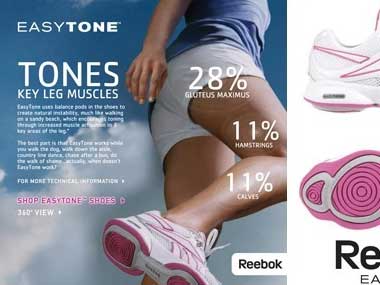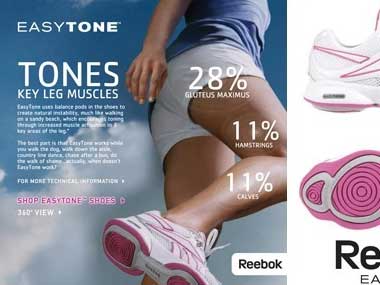The US Federal Trade Commission announced that Reebok International Ltd. has agreed to resolve charges that the company deceptively advertised “toning shoes,” which it claimed would provide extra tone and strength to leg and buttock muscles. Reebok will pay $25 million as part of the
settlement
agreement. The funds will be made available for consumer refunds either directly from the FTC or through a court-approved class action lawsuit. “The FTC wants national advertisers to understand that they must exercise some responsibility and ensure that their claims for fitness gear are supported by sound science,” said David Vladeck, Director of the FTC’s Bureau of Consumer Protection. [caption id=“attachment_95568” align=“alignleft” width=“380” caption=“Reebok’s EasyTone walking shoes and RunTone running shoes have retailed for $80 to $100 a pair, while EasyTone flip flops have retailed for about $60 a pair.”]
 [/caption] Reebok’s EasyTone walking shoes and RunTone running shoes have retailed for $80 to $100 a pair, while EasyTone flip flops have retailed for about $60 a pair. Ads for the shoes claimed that sole technology featuring pockets of moving air creates “micro instability” that tones and strengthens muscles as you walk or run. According to the
FTC complaint
, Reebok made unsupported claims in advertisements that walking in its EasyTone shoes and running in its RunTone running shoes strengthen and tone key leg and buttock (gluteus maximus) muscles more than regular shoes. The FTC’s complaint also alleges that Reebok falsely claimed that walking in EasyTone footwear had been proven to lead to 28 percent more strength and tone in the buttock muscles, 11 percent more strength and tone in the hamstring muscles, and 11 percent more strength and tone in the calf muscles than regular walking shoes. Beginning in early 2009, Reebok made its claims through print, television, and Internet advertisements, the FTC alleged. The claims also appeared on shoe boxes and displays in retail stores.
One television ad
featured a very fit woman explaining to an audience the benefits of Reebok EasyTone toning shoes. She picks up a shoe from a display and points to a chart showing the muscles that benefit from use of the shoes, while a video camera continues to focus on her buttocks. She says the shoes are proven to strengthen hamstrings and calves by up to 11 percent, and that they tone the buttocks “up to 28 percent more than regular sneakers, just by walking.” In India, technically, such a campaign would not have been allowed to run. “To ensure the truthfulness and honesty of representations and claims made by advertisements and to safeguard against misleading advertisements,” is one of the ‘fundamental principles’ of the self-regulation code defined by the members of the Advertising Standards Council of India.
[/caption] Reebok’s EasyTone walking shoes and RunTone running shoes have retailed for $80 to $100 a pair, while EasyTone flip flops have retailed for about $60 a pair. Ads for the shoes claimed that sole technology featuring pockets of moving air creates “micro instability” that tones and strengthens muscles as you walk or run. According to the
FTC complaint
, Reebok made unsupported claims in advertisements that walking in its EasyTone shoes and running in its RunTone running shoes strengthen and tone key leg and buttock (gluteus maximus) muscles more than regular shoes. The FTC’s complaint also alleges that Reebok falsely claimed that walking in EasyTone footwear had been proven to lead to 28 percent more strength and tone in the buttock muscles, 11 percent more strength and tone in the hamstring muscles, and 11 percent more strength and tone in the calf muscles than regular walking shoes. Beginning in early 2009, Reebok made its claims through print, television, and Internet advertisements, the FTC alleged. The claims also appeared on shoe boxes and displays in retail stores.
One television ad
featured a very fit woman explaining to an audience the benefits of Reebok EasyTone toning shoes. She picks up a shoe from a display and points to a chart showing the muscles that benefit from use of the shoes, while a video camera continues to focus on her buttocks. She says the shoes are proven to strengthen hamstrings and calves by up to 11 percent, and that they tone the buttocks “up to 28 percent more than regular sneakers, just by walking.” In India, technically, such a campaign would not have been allowed to run. “To ensure the truthfulness and honesty of representations and claims made by advertisements and to safeguard against misleading advertisements,” is one of the ‘fundamental principles’ of the self-regulation code defined by the members of the Advertising Standards Council of India.
Anant Rangaswami was, until recently, the editor of Campaign India magazine, of which Anant was also the founding editor. Campaign India is now arguably India's most respected publication in the advertising and media space. Anant has over 20 years experience in media and advertising. He began in Madras, for STAR TV, moving on as Regional Manager, South for Sony’s SET and finally as Chief Manager at BCCL’s Times Television and Times FM. He then moved to advertising, rising to the post of Associate Vice President at TBWA India. Anant then made the leap into journalism, taking over as editor of what is now Campaign India's competitive publication, Impact. Anant teaches regularly and is a prolific blogger and author of Watching from the sidelines.
)